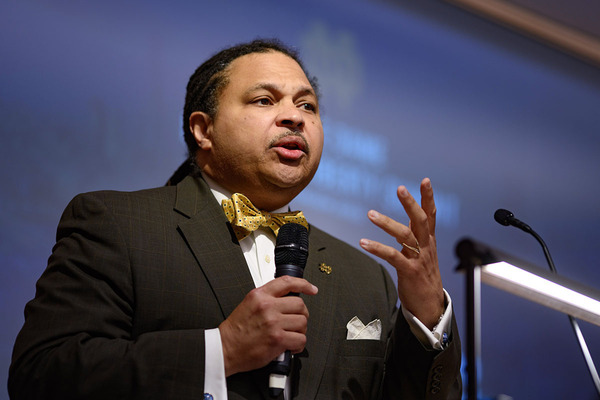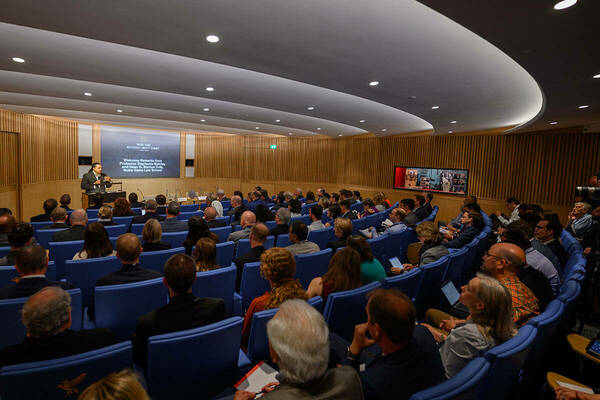2023 Notre Dame Religious Liberty Summit: Dean G. Marcus Cole’s welcome remarks

Hello and welcome to the 2023 Notre Dame Religious Liberty Summit. I am Marcus Cole, Dean of Notre Dame Law School, and the Founder of the Notre Dame Religious Liberty Initiative.
It is my pleasure to welcome you here to London for our third annual Religious Liberty Summit. I am delighted that we can once again host our Religious Liberty Summit in a city where our University, the University of Notre Dame, has a campus. That is very important to me because this fight for religious freedom is a global fight, and it requires global resources. The University of Notre Dame is proud that we have a footprint that spans the globe. We have a platform from which we can conduct this fight for religious freedom.
The purpose of these annual summits are threefold:
1) Our first purpose is to bring you all together — faith leaders, advocates, scholars, educators, judges, anyone who is interested in the ideas and concepts of religious freedom. It is important that you come together for conversations.
2) Through our conversations, both formal and informal, the hope is that you will share ideas, experiences, lessons, and strategies, with the purpose of advancing religious liberty and freedom of conscience for all people, regardless of their faith tradition, and even if they are not people of faith.
3) Finally, it is important that we use this annual opportunity to celebrate our successes and achievements, as well as learn from our mistakes.
As we are right to celebrate our successes — and we have many to celebrate — we should be cautious about becoming complacent. In fact, I would like to issue three words of caution.
1) Our victories, while impressive, have largely come in the courts of law. We must recognize that while these victories are important, they will be fleeting unless we also begin to win in the court of public opinion. We must explain the importance of religious freedom to all people, and as the basis of all of our freedoms, if we are to persuade others as to why religious freedom needs protection.
2) Some of our success should reveal that the opponents of religious freedom are committed to characterizing other issues as religious liberty issues, precisely in order to prevent such an education campaign. They are doing this to inflame misinformed passions and to take advantage of misunderstandings. Examples abound:
- 303 Collective was not a religious liberty case; it was a free speech case.
- Discussions regarding Title IX and the compulsory use of preferred pronouns is not a religious liberty issue; it is a free speech issue.
- If you recall from last year, we held this summit in Rome just after the release of the Dobbs decision. Dobbs was not a religious liberty case, and yet I received calls from reporters for a month about Dobbs as a religious liberty case and the role of the Religious Liberty Initiative in Dobbs. Frankly, the truth is that some people see this as an opportunity to derail our efforts at religious freedom by characterizing Dobbs as a religious freedom case — one that is an attempt to advance theocracy, which is the opposite of what religious freedom is and the opposite of what we are trying to do.
3) This effort highlights my third word of caution: the court of public opinion remains largely unaware of the importance of religious liberty, and the role that it plays in our basic freedoms and rights. We cannot rely on the press to educate the public on religious freedom until and unless we educate the press. They already enter the conversation with misconceptions, precommitments, and their own biases — not because they have ill intention, but because they are human.

What we need to do is focus, not on the politics, but on the people.
There are real people — real living, breathing, existing people — who will be tortured, raped, and/or murdered in western China, Muslim Uyghurs, who are languishing in prison camps right now as we sit here, for no other crime than the fact that they worship Allah rather than Xi Jinping.
There are thousands of Yazidi women who have been sold into sexual slavery because of their belief in one God who entrusted the world to seven angels, rather than the distorted version of Islam advanced by Daesh.
There are blasphemy laws right now in Nigeria that have resulted in death sentences for young people who have merely sung songs online. A 13-year-old boy was given a 10-year sentence in Kano, Nigeria, for blasphemy. And Deborah Yakubu, a second-year Christian college student, was lynched in Nigeria for blasphemy.
In the United States, Catholic hospitals — the leading and largest providers of medical care, especially with regard to services to the poor — face the loss of their licenses to operate as hospitals if they refuse abortion services, assisted suicide, or gender reassignment surgery to minors, not because these services are unavailable from other providers, but because state legislators and regulators find their religious beliefs offensive.
By focusing on people, and the problems that people of faith can solve for them, we will educate the public and we will begin to win lasting victories in the court of public opinion. That is where we have to have our focus.
Again, this is a celebration, and we want to be joyous. But we also want to be serious, because we are dealing with serious issues with the most fundamental right that we as human beings have — our freedom of religion, our freedom of conscience.
Thank you for being here.